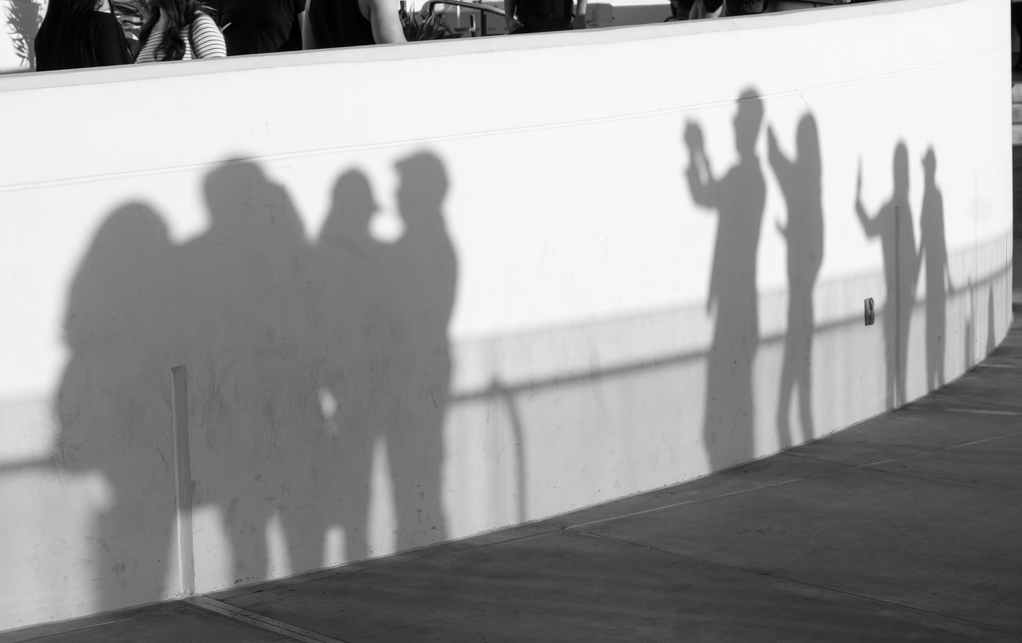Getting Past Our Shadow Projection

Shadow projection is a term you see a lot in self help books these days. It’s been popularized by writers like Connie Zweig, who emphasize the importance of “shadow work”. It really is important for us, especially right now.

To understand “shadow projection”, we first have to understand “shadow”. As Jungian analyst Daryl Sharp tells us, the Jungian term “shadow” refers to “hidden or unconscious aspects of oneself, both good and bad, which the ego has either repressed or never recognized”. Jung referred to the shadow more bluntly as “that which we do not wish to be.”
This part of ourselves which is unacknowledged, either because we’ve repressed it, or because we just don’t know about it, is incredibly important. We all have such a part of ourselves, no matter how “conscious” or “self aware” we might be. The fact that the conscious mind doesn’t acknowledge this dimension of ourselves doesn’t mean that this part of us has no influence upon us. As a matter of fact, the influence of “the shadow” on our lives is enormous.
The shadow can impact us in a wide range of ways. Just as an example, shadow is often very visible when someone is undergoing the midlife transition. People at this stage of life may well connect with parts of themselves that they had completely forgotten about, or which they didn’t ever know were a part of their makeup. This can be very demanding for the ego. The ensuing interaction may take us to places we had never dreamed of going: out of marriages, careers and spiritual/religious commitments, and into entirely new ones, to name but a few possibilities. I mention this solely to illustrate the power of the psychological forces connected with shadow.
Keeping this awareness in mind, I’d like to consider the nature and power of shadow projection. Projection, according to Sharp is:
An automatic process whereby contents of one’s own unconscious are perceived to be in others.
Jungian Andrew Samuels elaborates on this:
Difficult emotions and unacceptable parts of the personality may be located in a person or object external to the subject. The problematic content is thereby controlled and the individual feels a (temporary) release and sense of well being. (Samuels et al, Critical Dictionary of Jungian Analysis)
So, shadow projection is when we unconsciously take the contents of our own shadow, and perceive them as belonging to another person or group of people. We take muck out of our own backyard, as it were, fling it onto someone else’s face, and are convinced that’s the way they actually look!

Dangers of Shadow Projection
As may be readily apparent, shadow projection is a very dangerous thing to do to others. It is also an extremely dangerous thing to do to yourself.
When we project our shadow on others, we see our own characteristics as being part of the other person. Let’s say we have two people who work in the same office. One [“the projector”] projects on the other [“the projectee”] that that person is lazy and unmotivated. This may be because “the projectee” has some other unrelated quality, such as a vague resemblance to someone “the projector” knew in the past—or a strange and unfamiliar-sounding last name. In that situation “the projectee” will particularly lose out, because they may well not have this characteristic at all. If “the projector” is a close working colleague, or worse, a supervisor, this may be quite damaging.
However, let’s not lose sight of the damage “the projector” does to themselves with this projection. The projection of laziness or lack of motivation onto another person, serves to make “the projector” less anxious about something in their own psyche. For instance, this individual may have a very strong investment in seeing themselves as a “good employee” who always meets the expectations and escalating demands of their employer. Yet they may be ignoring or repressing a part of themselves that actually deeply resents the demands of the employer, finds them excessive and wants to push back and assert boundaries.
This feeling may well be an essential and important part of “the projector” to which they need to listen. By projecting it, they get rid of some anxiety, it’s true. Yet, this can be at the cost of losing vitality and authenticity.
Facing Up to Shadow
It can be easy to run from our shadow, and shadow projection is one of the most common ways that we do this. It can be so extensive that it turns into a way of life. People can spend large parts of their life avoiding shadow through projection. They can pay a very heavy price for this, in that they fail to acknowledge essential parts of who they really are.
Shadow and Others
We need to be aware that shadow projection can creep into all of our interactions with others in profound ways. We need to stay alert to its possible presence in individual-to-individual interactions, but that is not all. Shadow projection can have an enormous impact on the way that whole groups are perceived by other groups in our society. This can have a profound impact on business, politics, and even the overall social cohesion of a society.
In our era, social differences on issues can be so polarizing. We see this in the tensions, stigmatization and vilification surrounding issues like “pro vax vs. anti vax” during COVID. How easy it is to lose sight of people in their individual uniqueness, and pigeon-hole them through unfair and demeaning stereotypes! In this era of social media, this is another type of “epidemic” of which all need to be aware.
Dealing with our shadow projection, and doing shadow work can be a great deal easier when we don’t have to do it in isolation. A close, supportive relationship with a Jungian /a-midlife-transition can often be of tremendous support in this work. If you feel that you’re dealing with issues of shadow and shadow projection, I strongly recommend you seek out support from a qualified Jungian analyst.
Wishing you every good thing on your personal journey,
